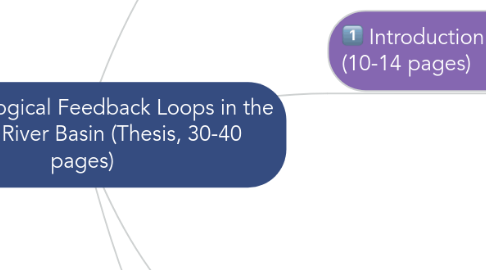
1. Considering Management Structures (6-8 pages)
1.1. Relationship of actors involved in management of Tualatin River (4-5 pages)
1.1.1. Small social network analysis (1 page)
1.1.1.1. Network analysis of USGS, Clean Water Services, City of Tigard, Tualatin Riverkeepers, Tualatin River Watershed Council, community groups, etc. will help shed light onto how these actors foster support for each other during the process of decision-making.
1.1.2. The impact of feedback mechanisms (3-4pages)
1.1.2.1. To what extent do social-ecological feedback loops impact the management and level of stewardship found in the Tualatin River Basin?
1.2. Managing a system with continuous change (2-3 pages)
1.2.1. Adaptive management strategies (2-3 pages)
2. Introduction & Background (10-14 pages)
2.1. Broad Themes (4-6 pages)
2.1.1. Social-ecology (2-3 pages)
2.1.1.1. What is a social-ecological network? How does it provide feedback loops?
2.1.2. Urbanizing watersheds (2-3 pages)
2.1.2.1. How does urbanization alter waterways?
2.1.2.2. What are common structural social relationships of actors involved in the management of urban watersheds (bottom-up, top-down, collaborative, adaptive, etc)?
2.2. Historical Context & Current State of Affairs (6-8 pages)
2.2.1. Tualatin River Basin (3-5 pages)
2.2.1.1. Basic historical details about settlement, land-use, urbanization, management, ecological make-up, etc.
2.2.1.2. Description of current ecological problems, management, land-use, agencies/organizations concerned with river health, community involvement, Clean Water Act, etc.
2.2.2. Summer Creek (3-5 pages)
2.2.2.1. Discuss history of Summerlake Park Dam, water quality problems, 2014 summer research with Tualatin Riverkeepers (brief background, methodology, results), my interactions with different agencies involved with ecological restoration and management in this jurisdiction
3. Situating Social-Ecological Feedback Loops (8-12 pages)
3.1. Summer Creek as a case study (5-7 pages)
3.1.1. Thermal Loading (5-7 pages)
3.1.1.1. What are the feedback loops related to thermal loading in this system?
3.1.1.2. What motivates responses to ecological problems such as thermal loading?
3.2. Urban waterways as social-ecological networks (3-5 pages)
3.2.1. System Responses in Riverine Macrosystems (3-5 pages)
4. Conclusion (6 pages)
4.1. Results, Broader Implications, & Further Research (6 pages)
4.1.1. Social-ecology in Summer Creek, Impacts of science research in elevating awareness and responses in this small system, Adaptive management for an adaptive system, Discussion of scale

